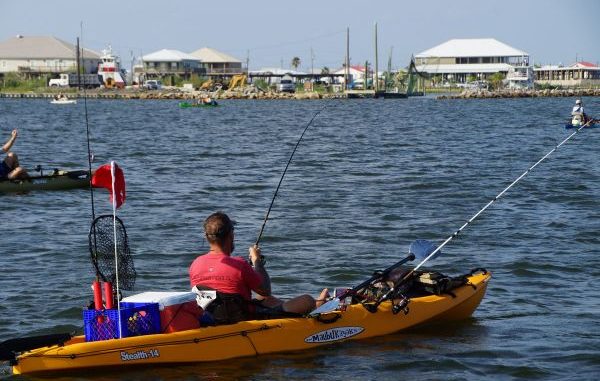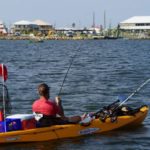
Everybody has to start somewhere. When it comes to kayak fishing, a quick poll shows participants in the sport come from all skill and experience levels.
There are many reasons folks get into kayak fishing, but the in-your-face fishing action is what keeps them there.
Those entering the sport are often called “newbies” or “noobs,” for short. It’s a descriptive but not a derogatory reference. Some come with little to no paddle-craft experience; some are even beginning anglers.
One of the popular threads on many kayak fishing forums is one dedicated to beginners and their many questions. This offers the new guys a place to ask anything they want and, as is often pointed out, there are no stupid questions.
Learning from more experienced kayak anglers can save time, money and even provide a measure of safety. Kayakers by nature are adventurous and are always looking to explore greener pastures. Fishing around Grand Isle, they’ll see rigs out in the Gulf and want to head there for bigger, more-challenging fish; luckily, many will seek advice first before undertaking what could prove to be a costly trek.
An angler was lost a couple of years ago and has never been found. He was last seen, alone, in his kayak a few miles off of Grand Isle. Out of concern, he was approached by a commercial fishing vessel, but the angler assured the captain that he was OK and not in need of any assistance.
When he was reported overdue the next day, a search turned up his kayak, but he was never located. It’s likely the cause of his disappearance will never be known.
By asking questions and advice from more-seasoned anglers, he might not have undertaken this journey — or at least not alone.
The No. 1 question is usually about what type of kayak to purchase or requests for opinions or advice on a particular brand or model.
The standard response to anyone thinking of purchasing a fishing kayak is to try out or demo as many different ones as you can. What you see in the store or in a sales ad might look great, but it might not work out for your size or style of fishing.
Actually doing a test drive is the absolute best way to assure you will be happy and comfortable with your purchase.
The kayaking community is friendly and accommodating — more so than most segments of the fishing world.
Recently, a new Louisiana resident asked a forum question regarding purchasing a fishing kayak for saltwater marsh fishing. He was an experienced angler, but new to the state as well as kayaking.
Several kayakers invited him to come to Grand Isle for the Ride the Bull tournament, where they assured him that they and many others would let him take a test ride in their yaks. With more than 700 participants, surely he’d be able to sample any kayak on his list.
Try that at your local powerboat marina and let us know how it goes.
Making an informed purchase is a good start for jumping into the world of kayak fishing.
Here’s a prime example of questions regularly asked by a newbie: “I just purchased my first kayak and have a few questions. Do most people go fishing by themselves or is it safer to have a buddy? Does it really matter? What are essential fishing accessories to put on the kayak?”
Responses many times start with “Welcome to the addiction.” Most newbies won’t grasp the power of that statement, but after a few successful trips, they’ll be repeating to others that come after them.
In answer to the first question, yes, it’s always safer to fish with one or more kayak friends. Safety in numbers is always the rule.
The kayak is bought, now what? The questions then turn to gear and accessories to outfit the new vessel.
Taking the minimalist approach, basics such as rod holders, landing net, pliers, anchor and a bag or chest to keep your fish in are all that’s really necessary.
Don’t let my wife know I wrote that.
However, there is virtually no limit to items that can be added to kayaks to give them all of the comforts and technological advantages of well-outfitted power boats. From electronics to Power Poles, the only limit is your budget.
This is where getting advice and personal experience from those that have been there is invaluable. Learning what others use and why, shortens the learning curve a bunch.
The goal is to have an enjoyable fishing trip, and fellow kayak anglers are willing to help you achieve that goal.
Asking about paddling techniques, launch locations, electronics, low-traffic areas are all good questions that no one is expected to automatically know the answers. Better to ask first than to learn the hard way.
Once the kayak and gear is in hand, the questions then turn to fishing.
Some are lucky and get a great start right out of the gate, while others make several trips with nothing to show but the dreaded skunk.
Encouragement is the name of the game, and getting just a few tips on areas to fish, baits and techniques can turn that skunk into a limit.
As with kayaks and accessories, fishing gear is often a matter of personal preference. However, getting advice from others can lead to informed tackle purchases that best serve the unique needs of the kayak angler.
Hook-ups are not just for fish. Kayak anglers not wanting to fish by themselves are using social media to find fellow ’yak anglers to meet up for a trip. This can be to explore new areas or just to have some company on the water.
Newbie kayak anglers are reminded that no one knows it all and what they do know they more than likely learned from others.
So don’t be afraid to ask questions. Although often thought of as a solo sport, just because someone is not literally in the same boat as you, figuratively you can be sure they once were.




